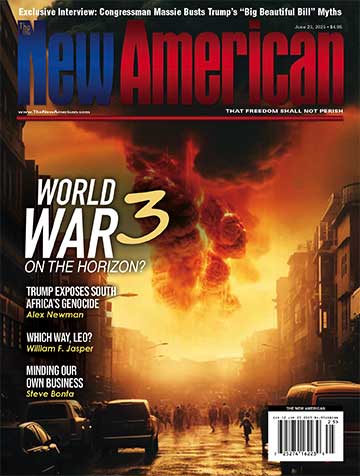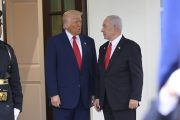
Stories of bags of cash being dropped off by the CIA on the desks of foreign regimes seems to have reached the ears of Senator Rand Paul (R-Ky.).
Last Friday, April 26, Sen. Paul sent a letter to Secretary of State John Kerry demanding that the State Department begin policing fraud in the foreign aid dollars doled out to foreign governments and that any findings be reported to the American people.
In a statement announcing the letter and its purpose, Paul points out that in testimony before the Senate Foreign Relations Committee last month, Kerry committed himself to investigating every report of “waste and abuse” of American aid sent overseas.
Senator Paul wants Kerry to push that promise a little further, proposing that all evidence of fraud be presented to the public. Then, armed with this knowledge, citizens can decide if their best interests are being served by donating millions to prop up scores of regimes around the globe.
The facts are irrefutable.
Several former Afghan government officials report the regular appearance and disappearance of sacks full of CIA “ghost money” in and out of the offices of President Hamid Karzai. As The New American has reported:
Americans are well aware of their monthly bills. But what they probably didn’t know — until now — is that every month they are also, via taxes, contributing to a slush fund for Afghan president Hamid Karzai. That, in a nutshell, is the story the New York Times broke on April 28.
“For more than a decade,” reported the Times, “wads of American dollars packed into suitcases, backpacks and, on occasion, plastic shopping bags have been dropped off every month or so at the offices of Afghanistan’s president — courtesy of the Central Intelligence Agency.”
“We called it ‘ghost money,’” Khalil Roman, Karzai’s deputy chief of staff from 2002 to 2005, told the paper. “It came in secret, and it left in secret.”
According to current and former Afghan and American officials, most speaking on condition of anonymity, U.S. taxpayers have thus far forked over “tens of millions of dollars” to Karzai’s office, where his National Security Council disburses the cash with no American oversight whatsoever, said the Times.
While this very recent account is unsettling and infuriating, such stories are nothing new when it comes to the history of savvy foreign governments taking advantage of U.S. foreign aid largesse.
Take, for example, the following lede in a story published last October by Breitbart.com:
“Just two weeks after the US Embassy in Egypt was ransacked by terrorists and a band of Egyptian thugs, President Obama announced that he would provide Egypt’s new Muslim Brotherhood government with an emergency infusion of $450 million in US aid.”
It’s not just the current administration that takes a laissez-faire approach to how the our money gets misused by beneficiaries. Consider this collection of stories from a chronicle of the foreign aid boondoggle published in 2005 by the Future of Freedom Foundation. Here’s a snippet:
A September 2002 White House report declared that foreign aid “has often served to prop up failed policies, relieving the pressure for reform and perpetuating misery.”
Foreign aid fails in part because of pervasive corruption. A 2003 report from a leading Bangladesh university estimated that 75 percent of all foreign aid received in that country is lost to corruption.
Northwestern University political economist Jeffrey Winters estimated that more than 50 percent of World Bank aid is lost to corruption in some African countries. President Olusegun Obasanjo of Nigeria announced in 2002 that African leaders “have stolen at least $140 billion from their people in the decades since independence.”
An African Union study pegged the takings at a much higher rate, estimating Africa’s toll from corruption at $150 billion every year. Lavish automobiles are so popular among African government officials that a word has come into use in Swahili — wabenzi — for “men of the Mercedes-Benz.” Investment guru Jim Rogers, who recently drove around the globe, declared,
Most foreign aid winds up with outside consultants, the local military, corrupt bureaucrats, the new NGO [nongovernmental organizations] administrators, and Mercedes dealers. There are Mercedes dealers in places where there are not even roads.
A Brookings Institution analysis observed,
The history of U.S. assistance is littered with tales of corrupt foreign officials using aid to line their own pockets, support military buildups, and pursue vanity projects. It is no wonder that few studies show clear correlations between aid flows and growth.
A Heritage Foundation report noted, “Most recipients of U.S. development assistance are poorer now than they were before first receiving U.S. aid.” Former World Bank senior economist William Easterly estimates that World Bank and IMF loans “actually boosted poverty worldwide by a total of 14 million people.”
The real story, however, is not the waste or the abuse of foreign aid. The more insidious aspect of the tale is the vicious cycle of monied interests and war profiteers that are kept flush by the fraud. As was expertly explained by the blog American Action Report in March, 2012:
Billions of dollars are borrowed in the taxpayers’ name, supposedly to help needy people overseas. Little or none of it is sent to needy people anywhere. It’s sent to foreign governments, whose corrupt leaders use the power of distribution to prop up their rule.
By agreement with the “donor” government, most or all of it is used to buy goods and services from U.S. corporations such as the military industrial complex.
Of course, the borrowed money has to be repaid to the banksters who had created it out of thin air. It’s not paid by the recipient government or by the corporations; it’s repaid by the American taxpayers — with interest paid over so many years that it amounts to several times the value of the loan, and the American people never get out of debt.
And the cycle continues.
Just days ago, in a hearing before the House Committee on Oversight and Government Reform, the deputy director of U.S. Agency for International Development (USAID), the federal agency charged with overseeing the foreign aid program — including in Afghanistan, where the infamous “bags of cash” were dropped off — testified about the rampant misappropriation of U.S. assistance by nations who routinely disregard federal government guidelines for the use of the money.
Michael G. Carroll provided a couple of typical examples of the fraud and how “humanitarian aid” ends up buying bullets:
In Pakistan, where USAID provided cash payments to support a Government program to help alleviate poverty, the host government transferred U.S. Government funds into its general budget account without authorization from USAID. USAID was not aware that the Pakistani Government had transferred the funds because it did not receive needed information from the host government and therefore could not adequately monitor the program. In connection with a USAID cash transfer agreement with the Jordanian Government, USAID did not monitor funds spent on specified development activities and $1.2 million in funds were used for prohibited activities, such as military spending.
Referring to just this type of admitted abuse, Senator Paul told Secretary Kerry:
I would hope that the rampant instances of waste and misuse, particularly ones already catalogued within your own Department, would be made available to the public, and investigated, so that the American people can judge for themselves whether the benefits of our aid are indeed worth the costs.
The true cost, however, is not just financial. When billions are siphoned from American citizens through unconstitutional and oppressive tax schemes and then funneled into the coffers of crooked foreign regimes, the Constitution and the liberty it protects are bartered away in the bargain.
Joe A. Wolverton, II, J.D. is a correspondent for The New American and travels frequently nationwide speaking on topics of nullification, the NDAA, and the surveillance state. He can be reached at [email protected]




